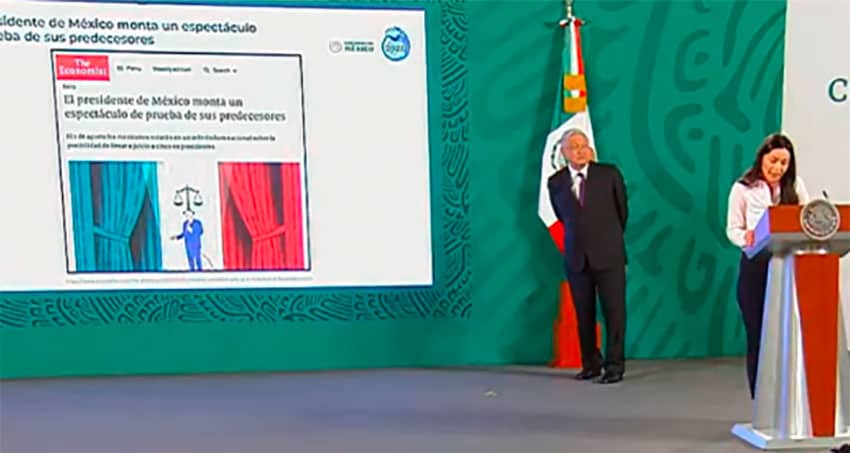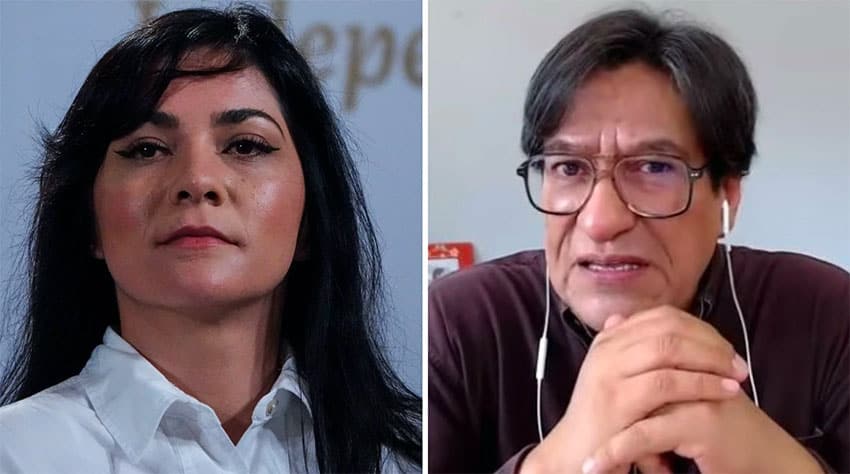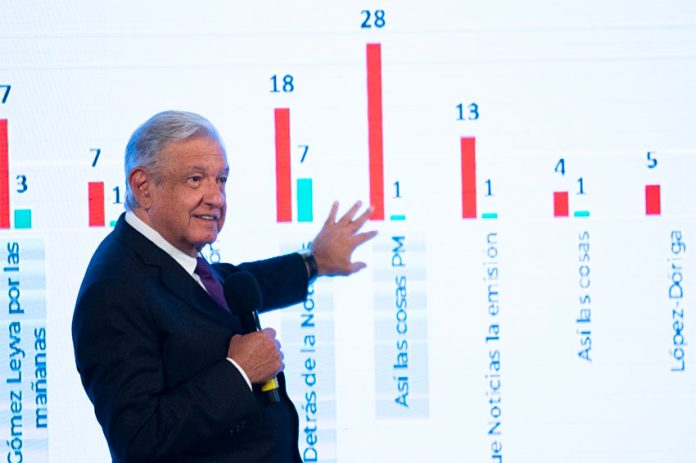More than 100 columnists and other contributors to El Universal have put their names to an open letter to President López Obrador to defend themselves and the newspaper in the face of ongoing attacks by the federal government.
“The president of Mexico has mentioned El Universal and its columnists and contributors on several occasions, sowing the idea that all criticism of his administration has an interest unconnected to journalism,” the letter said.
“This has no foundation at all. Freedom of speech is not the fruit of revenge nor of a conspiracy, it’s a hard won right in this country.”
Endorsed by columnists such as retired Supreme Court judge José Ramón Cossío Díaz, United States-based Mexico expert Duncan Wood, former first lady Margarita Zavala and cartoonists including Ángel Boligán, the letter asserted that El Universal doesn’t impose an editorial line on its contributors, who represent a “variety of positions and political opinions.”
Nor does the newspaper ask its contributors to join “campaigns of any kind,” it said.
“Those of us who write here are the masters of our own voices, pens [and] opinions,” the El Universal contributors said, adding that they they are not motivated by political and economic interests but rather “the quest for independent, rigorous and critical journalism.”
“President: what we do is called journalism, not yearning for supposed lost privileges,” the letter said, referring to López Obrador’s repeated claims that those who are critical of him and his government are angry at the loss of privileges they enjoyed during previous administrations.
The contributors rejected any suggestion that they are motivated by any other interest beyond providing “information and analysis of reality for our readers.”
Several journalists, including some that work for other media outlets, offered personal defenses of El Universal.
“Nobody ever called me to tell me, ‘Don’t go and publish that,’” said well known journalist Ciro Gómez Leyva, referring to years during which he contributed to the publication that describes itself as “The Great Newspaper of Mexico.”
“I had absolute freedom during the years in which, according to López Obrador, we all shut up,” he said in a radio interview.

The president has claimed that media outlets – many of which have depended heavily on government advertising to stay afloat – were in cahoots with previous governments and not critical of them as a result.
Echoing a call from the Inter-American Commission on Human Rights, Manuel Clouthier, an El Universal columnist and brother of Economy Minister Tatiana Clouthier, urged the government to scrap its “journalism lessons” – fake news exposé sessions officially called “who’s who in this week’s lies” that recently became a once-a-week feature of López Obrador’s weekday conferences.
The government presents “good journalism” as that in favor of President López Obrador, while journalism that is critical of the government is “bad, self-interested, sensationalist or conservative,” Clouthier charged.
Another “who’s who” of lies session was presented on Wednesday by the government’s fake news debunker-in-chief, Ana Elizabeth García Vilchis.
After explaining that fake news is “all pseudo-journalistic content” that seeks to pass itself off as real news, García asserted that the government’s aim was not to denigrate the media but to merely question it and expose lies and corruption.
An El Universal article asserting that the budget for the new Mexico City airport has been cut by 90% is false and a column by The Economist about this Sunday’s referendum over whether former presidents should be investigated for corruption is an example of “deceitful news,” she said.
“… We want to provide a relevant piece of information,” García said, explaining that there were 73 newspaper, television and radio reports based on The Economist column that portrayed the federal government in a negative light.
In addition, there were countless columns and opinion pieces that echoed criticisms of López Obrador that were first published by the British newspaper, she said. García also presented a study that monitored media coverage of the president.
“… In terms of print media, Reforma, El Universal, El Financiero, El Economista and La Crónica stand out for the most negative mentions about Andrés Manuel López Obrador” she said.
The coverage of the president by Reforma – also a frequent punching bag of the president – and El Universal was overwhelmingly negative, García said, explaining that there were 20 “negative mentions” about López Obrador for each positive one in both newspapers.
She singled out the journalists Joaquín López-Dóriga, Maricarmen Cortés and Mario Maldonado and the cartoonist Pacasso as “leaders” in the negative coverage of the president.
López-Dóriga, a Spanish-Mexican journalist who has his own news site, responded that he wouldn’t be intimidated by the government, while Maldonado said that his inclusion on the list of López Obrador’s chief critics added to his justification for signing the El Universal letter directed to the president.

“Today I was mentioned again in the [president’s] morning press conference because I exercise my [right to] freedom of speech,” Cortés, a radio, television and print journalist, wrote on Twitter.
“I will continue doing so, as I have always done, even though the 4T [fourth transformation] believes that journalists should only applaud and not be critical,” she said, referring to the government by its self-anointed nickname.
Another journalist attended yesterday’s presidential press conference to defend his work after he was mentioned in last week’s “who’s who” of fake news.
Julio Hernández, a journalist and columnist for La Jornada and director of the leftist newspaper’s San Luis Potosí edition, rejected claims that he had lied in his work.
“I’ve come here to point out that I haven’t lied,” he said, asserting that he has evidence to back up his claim.
Hernández, who has been a journalist for decades, said he was committed to independent and critical journalism – and “the truth” – and gave a lengthy defense of his work related to environmental issues in San Luis Potosí.
“Very good,” López Obrador responded. “Well, look, the right of reply and the right to dissent is now guaranteed, which is fundamental for democracy,” he added before engaging in a heated to-and-fro with the journalist.
With reports from El Universal
